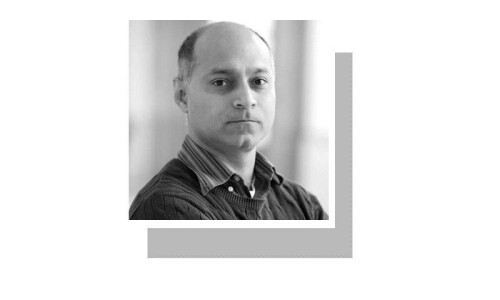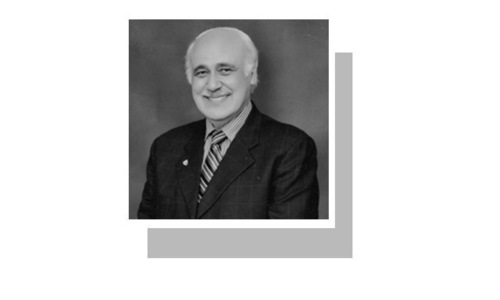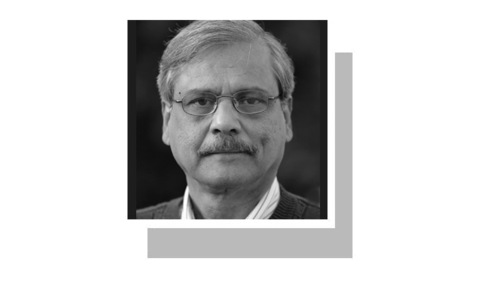
MR. Jinnah started his political career as Secretary to Dadabhoy Nauroji, the great old man of India, while he was in the UK and came back to the subcontinent after qualifying as a barrister. During his earlier days in politics Mr. Jinnah was a contemporary of Bal Gandathar Tilak and Gopal Krishna Gokhale, the two Indian stalwarts of the Congress. The leadership was passed on to others when they died between 1915 and 1920. Later, Gandhi, Nehru and the rest had to contend with Mr. Jinnah.
To a large extent, the Indian leaders all believed in Hindu Rashtra. The only difference was that Tilak and Gokhale were moderate and liberal leaders who wished to include the Muslims in their concept of Hindu Rashtra. They did not believe in the extremist ideology and theories of exclusion of Muslims and denial of their rights. Mr. Jinnah was labelled as the best ambassador of Hindu-Muslim unity and he worked towards his goal until Gandhi started playing the communal card.
Mr. Jinnah’s efforts to bridge the gap failed in 1944 when Gandhi-Jinnah talks held in Bombay, now known as Mumbai, did not yield any results. After the talks, in which Jinnah asserted that the 100 million Muslims of India constituted a nation, Gandhi made a public statement that “a body of converts cannot call themselves a nation”. To this Mr. Jinnah retorted the very next day in a public statement in which he explained how and why the 100 million Muslims of India were so fundamentally different from the Hindus and that by all tests and canons of international law, the Muslims constituted a nation. There were two nations in India he said; Hindus and Muslims.
The struggle of Muslims to achieve political and economic independence under the leadership of Mr. Jinnah and to overcome exploitation by the British and domination by the Hindus went on concurrently with the political struggle for an independent homeland where they could freely practice their religious beliefs and achieve political and economic independence.
From being the best ambassador of Hindu-Muslim unity to the founder of an independent state, Jinnah remained an outstanding leader.
For a while Mr. Jinnah seemed to give up the demand for a separate homeland by agreeing to the Cabinet Mission Plan brought to the subcontinent by Sir Stafford Cripps which involved a Muslim League government in each Muslim-majority province as this would have given the Muslims control over Sindh, Balochistan, Punjab, NWFP (now known as Khyber Pakhtunkhwa), Kashmir, Hyderabad, Bengal, Bhopal, Junagadh and other areas. The Congress was quick to reject the Cabinet Mission Plan, and Mr Jinnah took recourse to the Two Nation Theory, stating that Hindus and Muslims were two separate nations in the Indian subcontinent with equal rights.
Mr. Jinnah had achieved the impossible by making the Muslims of India realise they were a nation even before Pakistan became a reality in August 1947. He brought the scattered Muslim masses together at one platform, under one flag and with one voice – something which had never been done before.
The Hindus of India even before the partition were bent upon exploitation, suppression and domination of the Muslims. Kashmiris have long been suffering but this oppression has multiplied manifold since they are scrapped of their special status under the Indian Constitution. Jinnah, in his speech prior to the partition, had clearly said that the Muslims would never agree to a change of Masters.
In 1945-46 when Hindus were oppressing the Muslim population in Kashmir, exploiting them as well as dominating the entire Kashmir area by subjugating the Muslim population in Kashmir, Jinnah said: “I think the Hindu Mahasabha is much stronger so far as the Mussalmans are concerned. They make no secret of it, be it said to their credit. They do not resort to camouflage or finesse. Bluntly and point-blank, they say they want to establish a Hindu Raj in this sub-continent and Mussalmans must submit to it, and if Mussalmans do not behave themselves they will be treated as the Jews are treated … I do hope that immediate steps will be taken … to intervene and hold an inquiry into the recent occurrences in Kashmir which have resulted in bloodshed and the ruthless measure of oppression and suppression …” (September 11, 1945).
The Two Nation Theory was opposed by many at that time and surprisingly this opposition, though to a limited extent, still exists in Pakistan. Mr Jinnah clearly stated that Muslims desire freedom more than anyone else because the love for freedom, fraternity and liberty is the life and blood of their existence, but freedom must mean freedom from the British exploitation and Hindu domination, and that Muslims would never agree merely to a change of Masters from British to Hindus.
There were many who opposed Jinnah in his quest to seek a separate homeland for the Muslims of India. Unfortunately, today Indian Muslims are being challenged as to their status as citizens though born in India and will be expected to continue proving loyalty to India. History shows us that this policy will not succeed. The quest of Muslims to achieve liberty and freedom from domination will go on until India realises its mistakes and changes its policies.
In an interview to a foreign correspondent in Karachi on October 25, 1947, Jinnah said: “First and the foremost, both Dominions must make al-out efforts to restore peace and maintain law and order in their respective States – that is fundamental. I have repeatedly said that now that the division of India has been brought about by solemn agreement between the two Dominions, we should bury the past and resolve that, despite all that has happened, we shall remain friends. There are many things which we need from each other as neighbours and we can help each other in diverse ways, morally, materially and politically and thereby raise the prestige and status of both Dominions. But before we can make any progress, it is absolutely essential that peace must be restored and law and order maintained in both the Dominions.”
During the recent past, articles and letters have appeared in the media stating that Quaid’s Two Nation Theory had been vindicated and that Mr. Jinnah was right in his thinking and approach to the problems that faced the Muslims prior to 1947. Apart from criticising the theory, which now vindicates Jinnah completely, there are others who have been critical of Mr. Jinnah for not having written any essays, articles or thesis or done any research in history and historical movements.
Jinnah’s acumen, intellect, wisdom and vision are spread all over his speeches and statements from the time he entered in politics and until his demise on September 11, 1948. Criticism of Jinnah for not having written essays, articles or thesis is a statement which is best left ignored.
From being the best ambassador of Hindu-Muslim unity to the founder of an independent sovereign state, Jinnah earned the title of ‘Quaid-i-Azam’ from his people. Sarojini Naidu, a former president of the Indian National Congress, wrote a pen portrait in her immaculate English.
A gist of the pen portrait reads: “The true criterion of Jinnah’s greatness lies not in the range and variety of his knowledge and experience, but in the faultless perception and flawless refinement of his subtle mind and spirit; not in the diversity of aims and challenge of a towering personality, but rather in a lofty singleness and sincerity of purpose and the lasting charm of a character animated by a brave conception of duty and an austere and lovely code of private honour and public integrity.”
Sir Sultan Muhammad Shah, Aga Khan III perhaps paid the biggest tribute to Mr. Jinnah by stating: “The Quaid-i-Azam’s brilliant and epoch-making career, so untimely ended, reached its summit in these momentous years of 1946 and 1947. Now he belongs to history; and his memory, I am certain, is imperishable. Of all the statesmen that I have known in my life — Clemenceau, Lloyd George, Churchill, Curzon, Mussolini, Mahatma Gandhi — Jinnah is the most remarkable. None of these men in my view outshone him in strength of character, and in that almost uncanny combination of prescience and resolution which is statecraft.”
Jinnah declined the offer to become the first prime minister of a United India. He refused titles and clearly indicated to Gandhi and others that he would like to be addressed as ‘Mr. Jinnah’. And nothing else.
Our misfortune is that we have not paid enough attention to nation-building which would have produced leadership in the role model of Mr. Jinnah, a leader with personal honour and public integrity, but hope lies eternal in the human heart.
The writer is the grandnephew of Quaid-i-Azam Mohammad Ali Jinnah.
















































